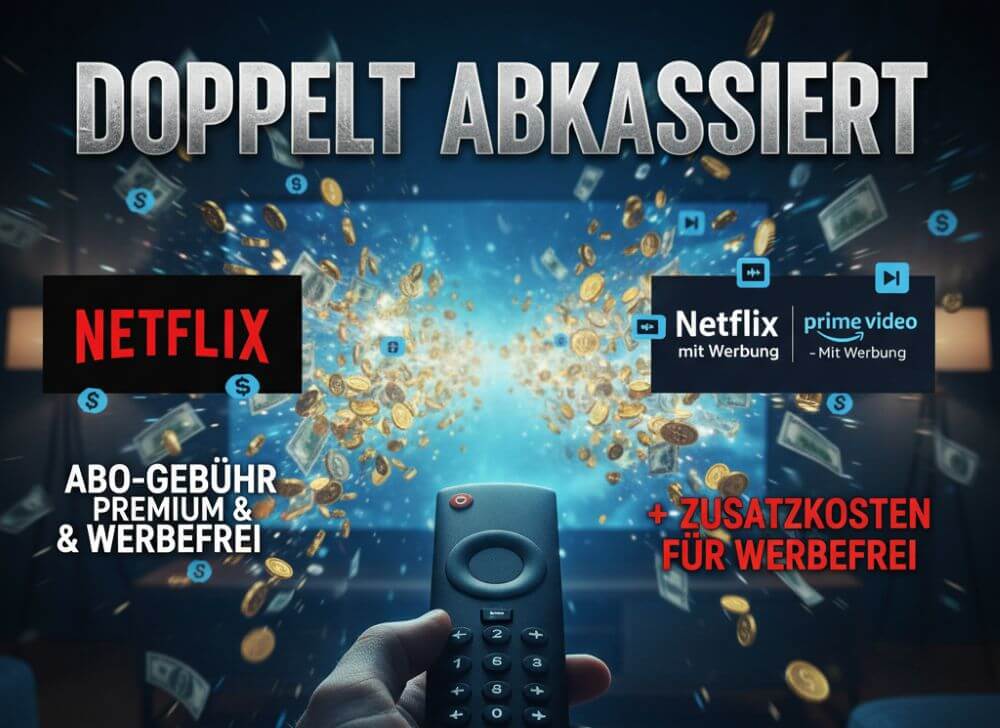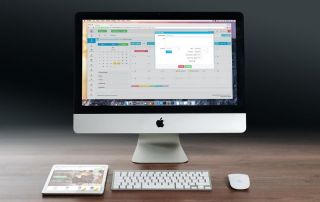Why Netflix, Amazon & Co. are now charging us double
It was the great promise of the streaming revolution: uninterrupted entertainment, whenever you want. But that promise is crumbling before our very eyes. Instead, we’re witnessing the return of the very model we were trying to overcome—and we’re paying premium prices for it.
Remember the moment you canceled your cable TV subscription? The main reason was often not just the price, but the sheer unbearable nature of the constant commercials. Netflix and the first streaming services were a liberating breakthrough: a fair monthly price for uninterrupted enjoyment.
That era is officially over. The streaming giants have discovered a new, far more lucrative source of revenue—and the customer is getting doubly disadvantaged in the process.

The turning point: Amazon’s audacious move
Amazon took its most aggressive step in early 2024. Instead of introducing a new, cheaper advertising plan, the company chose the opposite approach: All existing Prime Video customers—who already pay for the Prime service—were forcibly switched to an ad-supported plan.
Those who want to continue watching ad-free have to pay an additional €2.99 per month.
This isn’t a price reduction for bargain hunters; it’s a hidden price increase for everyone who wants to maintain the status quo. Amazon has thus devalued the established Prime subscription overnight. Customers now pay for the privilege of not seeing ads, in addition to the cost of a subscription that was once ad-free.
The salami tactic: Netflix and Disney+ follow suit
Netflix and Disney+ were more subtle, but no less consistent. They introduced “basic plans with ads” that were cheaper than their ad-free counterparts. At first glance, this seems fair: those who want to save money accept advertising.
But the reality is different:
- The “standard” subscription is becoming unattractive: the ad-free plans have been massively increased in price at the same time. The “standard” plan (ad-free, Full HD) is being made so unattractive price-wise that new customers are psychologically pressured into the cheaper ad-supported subscription.
- Hidden downgrades: The Netflix ad-supported plan not only lacks content (due to licensing restrictions), but also features like downloads.
- The shift in the norm: Netflix is now pushing the ad-supported subscription as its new “standard” product. The goal is clear: Advertising revenue per user is often more valuable to corporations than the pure subscription fees.
The broken promise: We are now paying double.
The feeling of being “cheated” that many customers experience is justified. We are moving towards a system that combines the worst of both worlds:
- We pay a monthly subscription fee (like with old pay TV).
- And yet we still get commercial breaks (like with old free TV).
The industry cynically calls this a “hybrid model.” For customers, it’s simply “double-dipping.” Uninterrupted binge-watching, once the core argument for streaming, is becoming an expensive luxury upgrade that has to be purchased in addition to the basic fee. The revolution is devouring its own children—and sending us the bill.
Beliebte Beiträge
From assistant to agent: Microsoft’s Copilot
Copilot is growing up: Microsoft's AI is no longer an assistant, but a proactive agent. With "Vision," it sees your Windows desktop; in M365, it analyzes data as a "Researcher"; and in GitHub, it autonomously corrects code. The biggest update yet.
Never do the same thing again: How to record a macro in Excel
Tired of repetitive tasks in Excel? Learn how to create your first personal "magic button" with the macro recorder. Automate formatting and save hours – no programming required! Click here for easy instructions.
IMAP vs. Local Folders: The secret to your Outlook structure and why it matters
Do you know the difference between IMAP and local folders in Outlook? Incorrect use can lead to data loss! We'll explain simply what belongs where, how to clean up your mailbox, and how to archive emails securely and for the long term.
Der ultimative Effizienz-Boost: Wie Excel, Word und Outlook für Sie zusammenarbeiten
Schluss mit manuellem Kopieren! Lernen Sie, wie Sie Excel-Listen, Word-Vorlagen & Outlook verbinden, um personalisierte Serien-E-Mails automatisch zu versenden. Sparen Sie Zeit, vermeiden Sie Fehler und steigern Sie Ihre Effizienz. Hier geht's zur einfachen Anleitung!
Microsoft 365 Copilot in practice: Your guide to the new everyday work routine
What can Microsoft 365 Copilot really do? 🤖 We'll show you in a practical way how the AI assistant revolutionizes your daily work in Word, Excel & Teams. From a blank page to a finished presentation in minutes! The ultimate practical guide for the new workday. #Copilot #Microsoft365 #AI
Integrate and use ChatGPT in Excel – is that possible?
ChatGPT is more than just a simple chatbot. Learn how it can revolutionize how you work with Excel by translating formulas, creating VBA macros, and even promising future integration with Office.

































